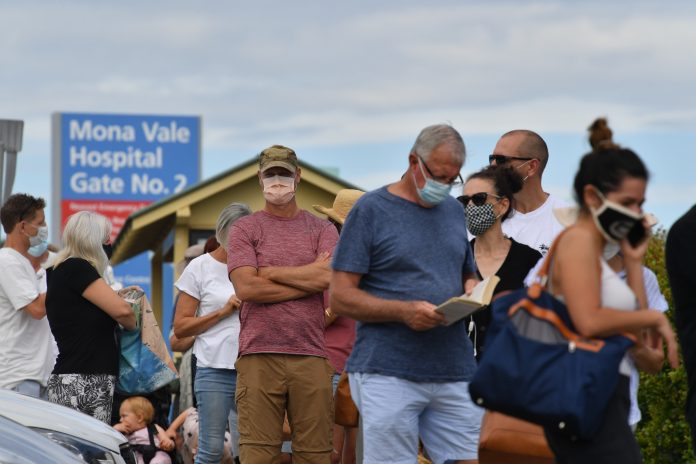The COVID-19 cluster in Sydney’s Northern Beaches has ballooned to 17, while the source of the infections remains a mystery.
Fifteen new cases were identified on Thursday, with health authorities urging locals to stay at home as much as possible over the next three days.
NSW Health says residents should not visit hospitals and aged care facilities unless essential, avoid unnecessary gatherings, keep to their household groups, and avoid high-risk venues like gyms.
People should avoid unnecessary travel to the Northern Beaches and people living there should avoid leaving.
The new cases are still being interviewed and more cases will probably be identified, NSW Health warns.
Authorities are investigating a potential super-spreader event at a local RSL, Chief Health Officer Kerry Chant says.
Earlier
A new COVID-19 cluster on Sydney’s northern beaches has grown to five, including an aged care worker at Avalon Beach and a band member.
Twelve consecutive days without local COVID-19 cases in NSW ended on Wednesday after a Sydney airport driver was confirmed to have the virus and two mystery cases popped up on the northern beaches.
In total, three new local cases of COVID-19 were uncovered in the 24 hours to 8pm on Wednesday, as well as six cases in hotel quarantine.
Another three cases on the northern beaches have been identified since 8pm on Wednesday, NSW Health Minister Brad Hazzard confirmed on Thursday.
Two cases are a Palm Beach woman in her 50s who worked at the Pittwater Palms aged care facility at Avalon Beach and her partner, while the third is in a man in his 60s who lives in Frenchs Forest.
He was in a band which held recent gigs around Sydney, including one at Avalon RSL last Friday which authorities believe resulted in a virus-spreading event.
The ABC reports that NSW chief health officer Kerry Chant confirmed authorities were working on a theory that the spread may have originated at the Avalon RSL.
Multiple venues up and down the northern beaches have now been identified as places recently visited by infected cases.
Hundreds of people started queuing up at Mona Vale Hospital early on Thursday to get tested for the virus and multiple pop-up testing centres are now in place.
Premier Gladys Berejiklian also flagged on Thursday some northern beaches nursing homes may be locked down until the outbreak is contained.
“We want to get on top of this and don’t want this concerning us in the last few days before Christmas,” Ms Berejiklian told reporters.
“There are a number of aged care facilities which are very vulnerable in the northern beaches, so (NSW Health) will also be issuing a directive to say (to) certain aged care facilities on the northern beaches, we’re recommending no visitors until we identify the source of the infection and feel more confident that we have it under control.”
The latest outbreak has also prompted concerns about whether the recently-opened Queensland and WA borders will again be shut to people from NSW over Christmas.
WA Premier Mark McGowan didn’t rule out reimposing restrictions if further infections were detected in NSW, saying “if the advice comes back that we need to put up a hard border, then we will”.
Acting Queensland Premier Steven Miles said the government was not considering fresh border restrictions at this stage, saying the next 48 hours would be important.
Mr Hazzard implored the two states to avoid “pre-emptive” action.
“My blood pressure hasn’t gone up, my pulse hasn’t gone up, we’re just doing what we do in NSW – handling the cases,” he told reporters.
NSW Health is urgently undertaking genomic sequencing and contact tracing to stem the damage and pinpoint the source of the northern beaches infections.
The cases were identified just hours after a 45-year-old driver transporting international air crew members to and from Sydney Airport was confirmed as COVID-positive.
The southwest Sydney man worked only with air crew members and was not involved in regular taxi services for the public. He also wore a mask while working.
Mr Hazzard said a stronger quarantine regime for international air crew members may be required to eliminate future risk – possibly by placing air crew in full hotel quarantine until their flight back out of Australia, which usually occurs within 72 hours.





